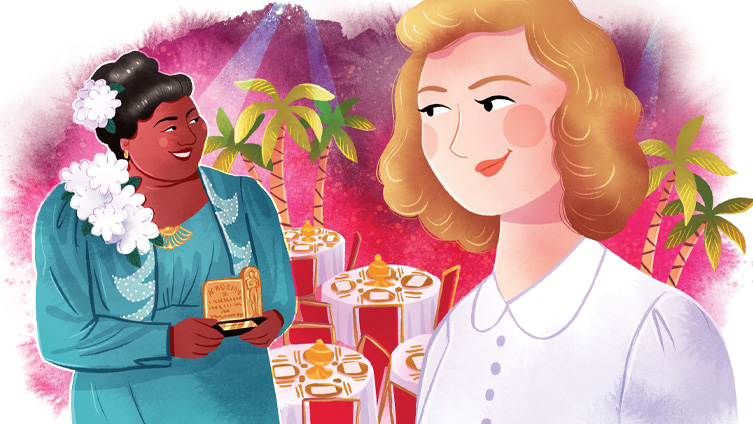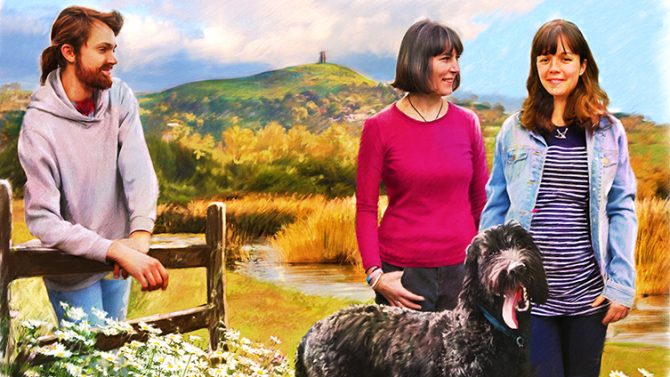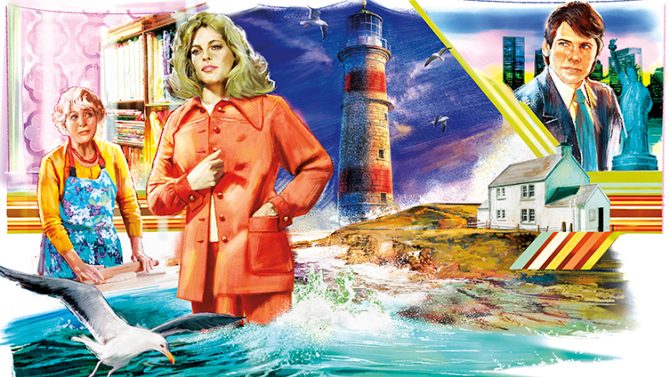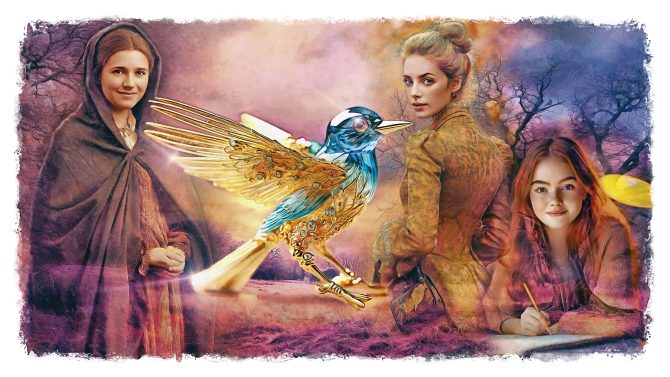The City Of Dreams
Jeannie didn't know it yet but this was going to be a night unlike any other...

Illustration: Sarah Holliday
Subscribe to The People’s Friend! Click here
Jeannie didn't know it yet but this was going to be a night unlike any other...

Illustration: Sarah Holliday
HISTORICAL SHORT STORY BY ALISON CARTER
In this story, set in the 1940 Jeannie didn’t know it yet but this was going to be a night unlike any other…
ou couldn’t tell there was a war in Europe, not in the Ambassador Hotel, Los Angeles.
It was the grandest building Jeannie Mishkov had ever set eyes on, a place of stars and smiles and exotic scents, where troubles stayed at the door.
Inside the enormous hotel, like one Russian doll inside another, was the Cocoanut Grove nightclub, impossibly glamorous with real palm trees reaching up to the ceiling and hundreds of red velvet chairs.
“Hurry up,” Doris, Jeannie’s colleague on the hat-check counter, said. “This is the rush coming.”
Jeannie reached out her arms and into them fell a fur so light and soft that she wondered if it was real. After that came a man’s overcoat and homburg.
“Thank you, sir, madam,” Jeannie said.
She looked into the faces of the couple and tried to decide if they were actors.
Doris had said that most guests would be other folks – directors, animators, set designers.
She didn’t recognise the couple, but then she’d hardly been to the movies so that was no surprise.
Where Jeannie came from, the nearest picture house was an hour’s bus ride away.
“Hurry up!” Doris hissed under her breath as she passed Jeannie with two cloaks draped over her shoulder. “Stop staring.”
Jeannie was new to LA. Her parents in Nevada had discouraged her from leaving their small town. They didn’t understand why she wanted to – neither of them was a dreamer.
Jeannie loved to cook. She’d learned at the local diner, and when the owner had become ill, Jeannie had taken over the menu.
Despite her mother’s warnings about being new-fangled, the diner flourished.
Jeannie created a spicy version of the meatloaf and younger customers loved it.
She added lasagne, taught to her by Mr Peretti from the hardware store, and a real Caesar salad with anchovies sent from the city.
She left the diner in the hands of her cousin, announcing that she wanted to be a chef in a proper restaurant in LA.
“A chef?” Jeannie’s mother had queried.
“That’s my hope,” Jeannie replied.
Mrs Mishkov frowned and went back to the laundry.
Jeannie took no notice of her mother’s doubts. She wanted to cook and had come to LA because it was a cheap bus fare, and because she knew there were thousands of restaurants there.
Someone would give her a chance, surely.
Nobody had done that so far, and after a few waitressing jobs, Christmas had been lean and January worse.
In February, her room-mate had said a temporary position was up for grabs at the Ambassador, checking coats.
“It’s for the Academy Awards,” Mary told her.
“What are those?”
Mary was an aspiring dancer with an encyclopaedic knowledge of Hollywood, and she’d rolled her eyes and explained.
She got Jeannie the job, so here she was, taking coats.
“Is that really him?” she whispered to Doris as a group entered through the main doors.
“Charles Laughton!” Doris whispered back. “The English guy. ‘Jamaica Inn’.”
Jeannie hadn’t seen that movie, but she knew who Charles Laughton was, and tried not to stare.
Through another set of doors Jeannie could see the nightclub’s huge floor filling up with ladies and gentlemen in gowns and tuxedos, gathering around tables.
“This place doesn’t change,” an older lady at the counter said. “Don’t you think they could redecorate?”
It took Jeannie a moment to realise she was being addressed.
“I quite like it,” she replied. “I like the palm trees. Do they plant them in pots, d’you think?”
The lady smiled and moved on.
“They’re not real trees,” Doris whispered. “They’re papier-maché.”
Jeannie felt like a fool, but Doris was already moving on, saying goodbye. She had been working since 11 a.m. and was at the end of her shift.
Doris was swiftly replaced by a slight black girl who nodded at Jeannie, said her name was Olivia, and got to work.
Jeannie looked to the doors, where more guests were filtering in.
Surely they must be among the last, she thought – the evening would be commencing soon.
Two couples held up proceedings, laughing and drawing attention to themselves.
They stayed by the counter after handing in their coats and dropped names loudly – Clark Gable, Elsa Lanchester.
Behind them came a tall, balding man and, behind him as he approached to hand over his coat, a black lady in a ruched dress and plain brown coat.
“Can I take anything, madam?” Jeannie asked, trying to catch the lady’s eye.
She was of middling height and curvaceous.
Her cheekbones stood out handsomely in a round, plump face on which was planted a smile.
There was nervousness there, though her expression was sweet.
In her hair she wore big white flowers – gardenias, Jeannie guessed, though she couldn’t tell if they were real.
Real or not, they were dramatically beautiful against the woman’s black hair and dark skin.
“Thank you,” the lady said, but she was too far away to be able to hand over her coat.
Her friend, the long-faced gentleman, turned.
“I’ll find the table in there,” he said. “Come in when you’re done here.”
The black lady smiled and stood waiting patiently behind the chatterers.
“You’re nearly done for the evening?” she asked Jeannie, passing the time.
“I have to wait until the end,” Jeannie said.
Olivia was behind her, tidying the racks, but Jeannie didn’t need help – there wasn’t much to be done and the porters were shutting the street doors.
“A lot of work for you coming in bursts, I guess,” the lady said, and Jeannie wondered who she was.
“I guess so,” Jeannie replied. “I don’t mind.”
“Hard work never hurt a soul,” the lady continued, “as long as the soul gets a wage for it.”
“I guess so,” Jeannie repeated.
“I bet the wage here isn’t much.”
“I’m just getting started,” Jeannie explained.
“That’s good. Show business?”
I want to be a chef.
“I see. Good luck.” The lady smiled.
Jeannie heard her crazy ambition coming out of her own mouth and felt embarrassed, like she was barking up a tree that she’d never get to climb.
She wanted to succeed, but knew that a lot of things would hold her back: a lack of sophistication, ignorance of the city and its ways, the fact she had no pieces of paper saying she could cook.
Maybe she had no right to try.
At last the people blocking the way moved on and the black lady handed in her coat, straightened the bodice of her dress and walked on, straight-backed.
“Oh, my.” Olivia was suddenly at Jeannie’s side.
“Who was that?” Jeannie asked.
“It’s typical that you don’t know. You’ve seen the movie, surely?”
“Which movie?”
Olivia tutted.
“‘Gone With The Wind’.”
“I wish I had. My sister told me that it’s very long.”
“It’s OK. That was Hattie McDaniel, and she plays a slave in that picture.”
“Oh.”
“A house slave called Mammy.” Olivia was disdainful. “They all keep saying how Miss McDaniel’s parents were slaves themselves, like that’s the important thing about her. She’s an actress.”
“Well, yes,” Jeannie replied.
“She’s good, and they pay her, but they don’t want her living near their mansions or sitting by them in the theatre.”
Olivia was watching Miss McDaniel as she made her way through the doors to the Cocoanut Grove.
“Could we watch, do you think?” Jeannie asked.
“I watched last year,” Olivia replied. “Of course, I can’t go inside.”
“I guess they don’t let coat check girls into the Oscars.” Jeannie laughed.
“I get double exclusion,” Olivia said. “They don’t want me in there because of the colour of my skin.”
“Oh,” Jeannie said again.
There was nobody in the lobby, so they sneaked up to the glass doors.
A sea of silk and feathers appeared before Jeannie, lovely women and handsome men, all smiling and nibbling at canapés.
She was sure she could see the back of Bette Davis’s head, though Olivia scoffed and told her Bette would be further forward.
“Doris must have checked her coat,” Jeannie whispered. “I didn’t get to see her face.”
Through the glass she could see Miss McDaniel seated at a table at the back of the hall, up against the wall.
It was a small table, and separate.
Olivia followed the direction of her gaze.
“Segregated,” Olivia explained. “You don’t know much, do you?”
“No,” Jeannie admitted.
It was true: she was all right at taking coats, but in this city how did she ever think she’d get any further than that?
“This hotel doesn’t allow black people in,” Olivia said. “I suppose it’s a favour to Miss McDaniel, because she’s nominated.”
“For an award?”
“Best actress in a supporting role. They won’t give it to her.”
“You said she was good.”
Olivia turned to face Jeannie.
“As I said, you don’t know much.”
The awards began. Jeannie could hear the speeches and it was nice, she thought, to be looking at glamorous people and the glinting statuettes.
She was sure she’d be heading back to Nevada when the month’s rent was used up, back to reality.
“This is the category,” Olivia whispered.
Jeannie looked at her; in her girlish face was a flicker of enthusiasm.
A pretty older lady with brown curls was on stage.
“I am especially happy that I am chosen to present this particular plaque,” she said.
There was a frisson in the hall, people turning to each other with faces alight.
“It opens the doors of this room,” the lady went on. “The entire nation will stand and salute the presentation of this plaque.”
Olivia grasped Jeannie’s hand.
“Hattie McDaniel.”
The room erupted in applause, and there was Miss McDaniel striding to the stage, her gown flowing behind her.
She took the podium, smiling calmly.
She thanked the Academy and said she was proud. Jeannie had heard enough speeches now to know it was a relatively ordinary one.
But she knew it was remarkable, too.
Just an hour before, she had taken that woman’s coat: the coat of the first black person to win an Oscar!
Olivia moved away, nonchalant.
“She’s still just a slave in that picture, you know; the audience still doesn’t know anything about her character because she’s just there to serve. But she’s good.”
Olivia turned and her eyes were flashing.
Jeannie was still gazing through the glass as Hattie McDaniel made the long journey back to her seat.
The man, whom Jeannie guessed must be her agent, pulled out her chair.
Jeannie watched Miss McDaniel tidy the skirt of her gown and pick up a fork. There was an elegant dessert on the table, waiting to be eaten.
If Hattie McDaniel could succeed, then maybe a cook starting out could get where she wanted to go – in this city of dreams.
Never miss an issue ‘The People’s Friend’ packed with even more stories on sale every Wednesday.

Paula Williams

Deborah Siepmann


Alison Carter


Teresa Ashby

Beth Watson

Alyson Hilbourne

Katie Ashmore

Kate Hogan

Liz Filleul

Beth Watson